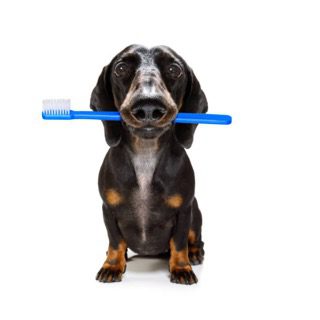

Dental disease in dogs is caused by the build-up of plaque, tartar, and bacteria. Symptoms of dental disease include bad breath, difficulty eating, excessive saliva, and swollen or bleeding gums. If left untreated, dental disease can lead to infections in the mouth and other parts of the body.
Dental disease in dogs is caused by a build-up of plaque, tartar, bacteria, and food debris between the teeth and along the gum line. Poor oral hygiene, an imbalanced diet, genetics, and age can all contribute to the development of dental disease. When bacteria accumulates between the teeth and gum line, toxins are released which can cause inflammation, swelling, gingivitis, periodontitis, pain, and damage to the teeth and gums. If left untreated, dental disease can lead to infection and systemic problems throughout the body.
Dental disease in dogs is usually diagnosed by a physical exam by a veterinarian. The veterinarian will look for signs of inflammation, infection, and damage to the teeth and gums. X-rays may also be used to assess the extent of damage to the teeth and roots. If further investigation is needed, the veterinarian may suggest a biopsy or other specialized tests.
Generally, dental disease is not very serious and its mortality rate is very low if it is properly treated. However, in severe cases, it can cause gum bleeding, infection, and tooth loss, which can lead to nutritional problems and other diseases such as diabetes. If left untreated, dental disease can lead to serious infections and even death. The mortality rate when left untreated is around 1%.
Dental disease in dogs is treated through routine dental cleaning, scaling, and polishing of the teeth. This typically involves removing built-up plaque and calculus, as well as any tartar or calculus accumulation that has formed under the gum line. The teeth may also need to be extracted or from infections that cannot be resolved with a dental cleaning. In some cases, antibiotics may also be prescribed to manage infection.
One way to help prevent dental disease in dogs is by brushing their teeth regularly. Scheduling regular professional dental cleanings is also important in maintaining oral health. Feeding your dog a tooth-friendly diet and providing chew treats can also help scrape away plaque and reduce the risk of dental disease. Additionally, annual physical exams can help catch any potential problems early and avoid long-term dental issues.
Dental disease in dogs is not contagious and cannot be spread to humans. However, it is important for owners to practice regular dental health care for their pets as part of their overall wellness. Untreated dental disease can lead to multiple secondary health problems in dogs, such as infection that can spread to other parts of their body.
Dental disease is often confused with periodontal (gum) disease, which occurs when the gum and soft tissues around the teeth become inflamed due to a build-up of tartar.
Home remedies that may be useful in managing dental disease include: brushing your dog’s teeth daily with a dog-safe toothpaste, regularly providing dental chews and treats to help keep their teeth and gums healthy, and scheduling regular vet check-ups for professional dental cleanings.
Remedies such as diet changes, dental treats, and daily brushing can help with dental disease in dogs. However, it is best to consult with a veterinarian so that they can assess the situation and provide the best possible treatment for your pup.
Many small to medium sized dog breeds tend to suffer from dental disease more than larger breeds due to their smaller dental arches and more crowded teeth. Breeds such as Pugs, Chihuahuas, Yorkshire Terriers, Shih Tzus, Pekingese, and Dachsunds are particularly vulnerable to dental disease as they have been bred for shorter muzzles and face shapes that can cause malocclusion of the teeth, making them more susceptible to infection and decay. Proper dental care is essential for these breeds, and should begin at an early age in order to prevent dental disease from occurring.
Have you ever had to deal with your dog experiencing dental disease? How did you respond to the situation? How were you feeling during the process? How did you manage it?
No matter what the outcome of the dental disease, we wish your pup the best of health and a happy and fulfilling life.